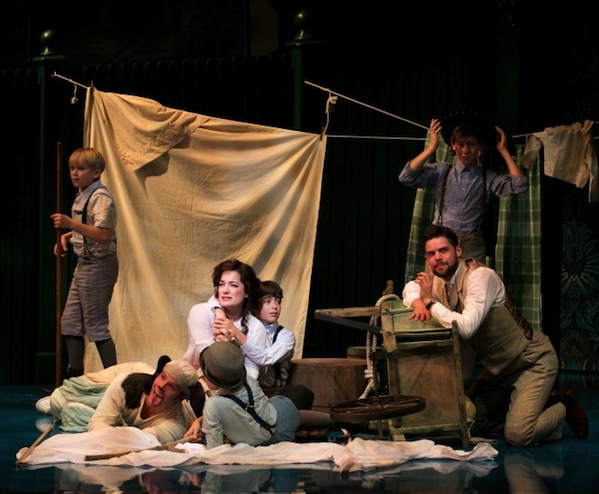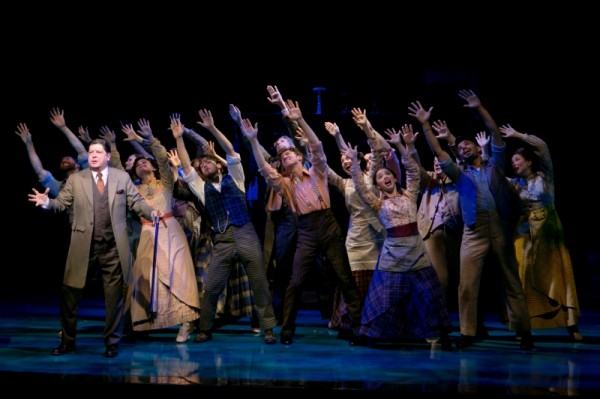Theater Review: “Finding Neverland” — A Lucrative Broadway Fantasy in Progress
The $3 million American Repertory Theater version of Finding Neverland remains a work in progress, a “tryout” as it has been dubbed, and it feels just like that.
Finding Neverland, Book by James Graham; music and lyrics by Gary Barlow and Eliot Kennedy. Presented by special arrangement with Harvey Weinstein, based on the Miramax motion picture written by David Magee and the play The Man Who Was Peter Pan, by Allan Knee. Directed by Diane Paulus. Choreography by Mia Michaels. Staged by the American Repertory Theater at the Loeb Drama Center, Cambridge, MA, through September 28.

The Llewelyn Davies family and J. M. Barrie go on an adventure in the yard in the American Repertory Theater production of “Finding Neverland.” Photo: Evgenia Eliseeva.
By Glenn Rifkin
Say what you will about Hollywood mogul Harvey Weinstein — he’s considered by more than a few in the movie community to be an overbearing ogre who has steamrolled over many a creative team — he’s been a blessing for those of us who love movies. In fact, if it wasn’t for Weinstein’s single-minded dedication to producing intelligent, small-budget, grown-up films, we’d all be left with little but Transformer and Spiderman sequels in the Cineplex.
Weinstein’s Oscar-rich resume includes such critically-acclaimed fare as Shakespeare in Love, Pulp Fiction, Good Will Hunting and Finding Neverland, the latter a 2004 film about Scottish author J.M. Barrie and the inspiration for his iconic play Peter Pan. Starring Johnny Depp and Kate Winslet, the sweetly realized tear-jerker was a surprising box office success and earned seven Academy Award nominations including Best Picture.
Now, Weinstein has turned his considerable influence and talent to taking a musical version of Finding Neverland to Broadway. Weinstein has been a passive investor in Broadway shows in the past, but this is his first personal effort to enter the theater world. And when Harvey wants something, attention must be paid. After an unsuccessful effort to stage the musical in Leicester, England in 2012, Weinstein turned the project over to a new creative team led by Diane Paulus, creative director of the American Repertory Theater in Cambridge.
After several weeks of previews, Finding Neverland had its world premiere on Wednesday, the day that Weinstein officially announced that the show would be moving to Broadway in March. Given the money and effort poured into the A.R.T. productions, plus Paulus’s remarkable recent Tony Award track record — she directed Pippin and Gershwin’s Porgy and Bess, while the A.R.T under the Artistic leadership of Paulus, produced All the Way, The Glass Menagerie, and the workshop production of Once, all of which found their way to Broadway, which was not unexpected.
Yet with all that hype and attention, the $3 million A.R.T. version of Finding Neverland remains a work in progress, a “tryout” as it has been dubbed, and it feels just like that. The show, written by James Graham, a young British playwright and screenwriter, with music and lyrics by Gary Barlow and Eliot Kennedy, is not quite ready for prime time.
That said, Finding Neverland has mega-hit written all over it, especially in an era of such family-friendly fare as The Lion King, Wicked, Aladdin, Matilda and Cinderella, all hugely successful, long-running Broadway heavyweights. Weinstein, in attendance at Wednesday night’s opening, told Ben Brantley of The New York Times, that he planned to pour another $11 million into the production before it reaches Broadway. With that type of support and some tweaks to the cast and music, Finding Neverland ought to be well represented at next year’s Tony’s.
In the meantime, the current version is intriguing but flawed. Starring Jeremy Jordan as J.M. Barrie, along with Laura Michelle Kelly as Sylvia Llewellyn Davies, Carolee Carmello as Sylvia’s mother Madame du Maurier, and Tony-winner Michael McGrath as Charles Frohman and Captain Hook, Finding Neverland is based on the true story of Barrie’s encounter and subsequent relationship with the Llewellyn Davies family, including the four young boys who inspired Barrie to write Peter Pan.
Barrie, mired in a loveless marriage and facing writer’s block, is under great pressure to write another hit play for his patron Frohman. All of London is wondering if the popular Barrie has another hit inside him. A chance encounter with the Llewellyn Davies clan in Kensington Gardens unleashes Barrie’s inner child, full of whimsy and fun, and his relationship with young Peter, morose and cynical after his father’s unexpected death, sets the stage for the unfolding story. If only Peter can learn to believe, to let his imagination go free, he will come alive and find the joy that he has lost.
This is an un-coming of age story, a paean to childhood, believing in fantasy and fun, of never growing up. At one point, Barrie exclaims, “Boys should never be made to go to bed. They always wake up a day older.”
I’ve always been a sucker for a great Broadway musical and in many ways, Finding Neverland does not disappoint. It has some solid laughs and offers a couple of show-stopping production numbers including “Hook” at the end of the first act and “Play” to start the second act, that send genuine chills up the spine. The supporting ensemble, especially Josh Lamon and Paul Slade Smith as actors in the Frohman troupe, are terrific. Mia Michaels infectious choreography brings the staging alive and earns a roar of approval. The production design, led by Scott Pask, particularly some astonishing special effects in the second act, is top-shelf.

Michael McGrath and company in the opening number of the American Repertory Theater production of “Finding Neverland.” Photo: Evgenia Eliseeva.
The music by Barlow and Kennedy is pop-oriented, reflecting their musical backgrounds (Barlow is a British singer/songwriter, pop star and member of the boy band Take That; Kennedy produces songs for Celine Dion and Spice Girls) and much of it is pleasantly forgettable. The show’s signature love song, “What You Mean to Me” a sweet duet by Barrie and Sylvia, could have been written for Top 40 radio, but it hits the mark in the context of the play, as does “Neverland” and “All That Matters” which builds to a crescendo in the show’s finale. I’m still waiting for a current Broadway cast album that calls to mind “My Fair Lady” but that is wishful thinking and no longer a requirement for success.
The problems are two-fold: The first act drags along until it reaches the introduction of Captain Hook, the bad guy who emerges from within Barrie’s tortured soul and who Frohman has insisted is a requirement for the play. Serious cutting and perhaps a couple of new numbers may well be required to boost the energy. The second act fortunately raises the temperature a few notches and portends the possibilities of a hit show here.
The larger issue is the cast. McGrath, reminiscent of Nathan Lane, is a delight as Frohman and the Tony winner (Nice Work If You Can Get It) steals most of the show, especially with his wicked star turn as Captain Hook. Kelly, who originated the title role in Mary Poppins in London, has an Idina Menzel voice and easily carries Sylvia off into Neverland. But Jeremy Jordan as J.M. Barrie, despite a strong voice, does not have the gravitas this show will require to become a Broadway hit. He never quite soars and while his singing is more than adequate, his acting skills just can’t carry the show. The boys are also just okay and I wouldn’t be surprised to see different faces, especially Peter, when it opens in New York.
I have no doubt that the taskmaster Weinstein sees all and he has never been shy about offering his creative suggestions. Will he and Paulus mesh as this production evolves? Will there be angry shouting matches in the wings? Stay tuned. If you can see it now in Cambridge, you will have an enjoyable evening of musical theater and spend a lot less on tickets than if it becomes a hit on Broadway. Just remember that greatness must be earned and this production is still paying its dues.
Glenn Rifkin is a veteran journalist and author who has covered business for many publications including The New York Times for more than 25 years. Among his books are Radical Marketing and The Ultimate Entrepreneur. His efforts as an arts critic and food writer represent a new and exciting direction.
Tagged: Broadway, Captain Hook, Diane Paulus, Finding Neverland, Harvey Weinstein, Michael McGrath, musical

With all respect, Glenn, it’s totally absurd to credit Harvey Weinstein with being the one person opposing a Transformers Hollywood. Even if you think he’s been a great force in independent cinema (I don’t), he’s just one of many indie distributors, though the most visible as a roaring one-man PR machine. And small-budget films aren’t what he’s into at all. Weinstein’s various companies and Sony Classics are the giants among so-called indies, routinely packaging films with big stars and lavish production budgets. I guess it’s a matter of taste if Shakespeare in Love and Good Will Hunting are the apotheosis of the art film. They certainly are prime Harvey Weinstein and, in my view, not art cinema at all. I don’t care especially for Spider Man, which you mentioned, but I surely prefer it to many films with Harvey Weinstein’s feel-good, middlebrow stamp.
And it’s dreadful that the ART and Diane Paulus is under the sheets with him.